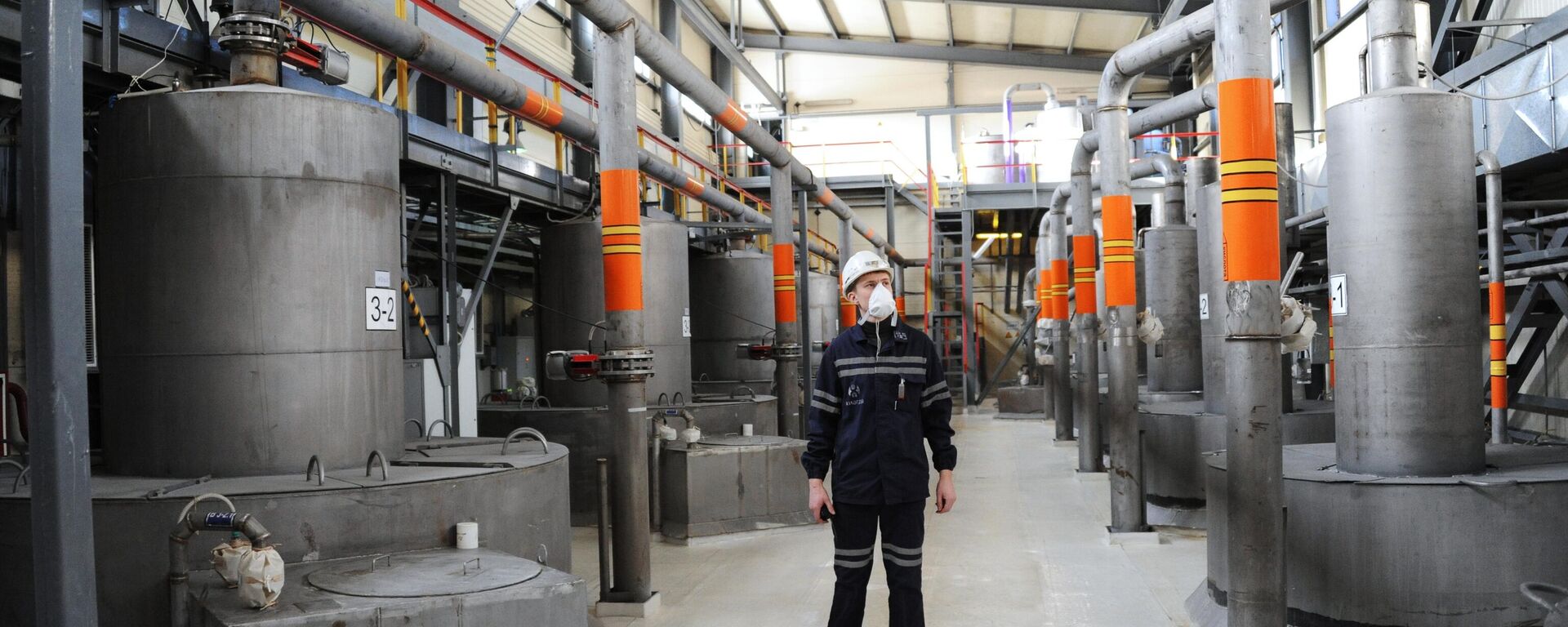https://sputnikglobe.com/20240707/who-will-benefit-from-boom-in-uranium-demand-1119276273.html
Who Will Benefit From Boom in Uranium Demand?
Who Will Benefit From Boom in Uranium Demand?
Sputnik International
Western short-sighted sanctions on Russia exposed Europe’s dependency on Russian oil and gas. This has emboldened nuclear advocates and, accordingly, fueled an increased scramble for uranium, acknowledged The Economist.
2024-07-07T12:17+0000
2024-07-07T12:17+0000
2024-07-08T12:17+0000
economy
russia
uranium
uranium enrichment
russian economy under sanctions
kazakhstan
kazakhstan
us energy department
rosatom
https://cdn1.img.sputnikglobe.com/img/07e7/08/18/1112838433_0:158:3077:1889_1920x0_80_0_0_f1d31917676fe1edc556fc7a70be7639.jpg
A scramble for uranium has developed after the Ukraine conflict and short-sighted Western sanctions on Russia exposed Europe’s dependency on Russian oil and gas, The Economist has argued.Kazakhstan is the largest uranium producer in the world but, unfortunately for Europe, boasts a close relationship with Russia and just hosted the 2024 Shanghai Cooperation Organization (SCO) summit.With an American ban on uranium enriched in Russia soon to kick in, the West is scrambling to devise more ways to import mined uranium from Kazakhstan directly, noted the publication.However, the legislation allows for waivers in cases when the US determines that no alternative viable source of low-enriched uranium is available to sustain the continued operation of a US nuclear reactor or nuclear energy company, or if it also determines that importing the uranium is in the national interest.Any waiver issued by the US Energy Department must terminate by January 1, 2028, while the ban itself expires on December 31, 2040.A cursory glance at data shows who stands to gain from the uranium boom.It could take the US “years” to replace banned Russian uranium exports, experts previously told Sputnik. Imports of Russian-enriched uranium to the US surged to a record level of $1.2 billion in 2023, marking a 40% increase compared to the import volume for 2022, according to the Bellona Environmental Foundation. The surge was attributed to growing prices and increasing physical volumes of Russian nuclear fuel acquired by the US, rising from 588 tons in 2022 to 702 tons in 2023.
https://sputnikglobe.com/20240514/us-ban-on-russian-uranium-imports-wont-fare-better-than-other-failed-western-sanctions–expert-1118425211.html
https://sputnikglobe.com/20240511/why-russian-uranium-ban-has-given-entire-us-nuclear-industry-the-shivers-1118389908.html
russia
kazakhstan
kazakhstan
2024
News
en_EN
https://cdn1.img.sputnikglobe.com/img/07e7/08/18/1112838433_174:0:2903:2047_1920x0_80_0_0_617095416b5cd2129a1a46f12736c44f.jpg
russian uranium export, russian uranium ban, us banned russian enriched uranium, russian uranium ban will grant waivers through 2027, centrus energy stated it will apply for waiver to buy russian enriched uranium, low enriched uranium, rosatom, tenexus uranium imports, prohibiting russian uranium imports act, russian us energy cooperation
russian uranium export, russian uranium ban, us banned russian enriched uranium, russian uranium ban will grant waivers through 2027, centrus energy stated it will apply for waiver to buy russian enriched uranium, low enriched uranium, rosatom, tenexus uranium imports, prohibiting russian uranium imports act, russian us energy cooperation
The US ban on Russian uranium imports is set to come into force in August, but is likely to be just as self-harming as other failed Western sanctions, numerous pundits have told Sputnik.
Natural uranium, containing approximately 0.7% of isotope uranium-235 (U-235), is the mineral at the start of the supply chain for nuclear power. To be used as nuclear fuel, the percentage of U-235 must be increased to 3–5% through enrichment.
US President Joe Biden signed into law H.R.1042, the Prohibiting Russian Uranium Imports Act, in mid-May. It will ban any imported unirradiated low-enriched uranium (LEU) produced in the Russian Federation or by a Russian entity. The law takes effect on August 11.
However, the legislation allows for waivers in cases when the US determines that no alternative viable source of low-enriched uranium is available to sustain the continued operation of a US nuclear reactor or nuclear energy company, or if it also determines that importing the uranium is in the national interest.
Any waiver issued by the US Energy Department must terminate by January 1, 2028, while the ban itself expires on December 31, 2040.
A cursory glance at data shows who stands to gain from the uranium boom.



